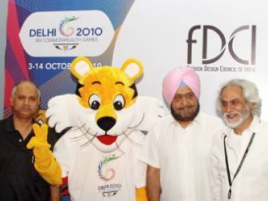No Beef at Mega Sports Event in New Delhi
By M.G. Srinath | Май 05, 2010

India has said that at the Commonwealth Games mega sports meet in New Delhi in October where athletes from 71 nations are scheduled to participate, no beef will be served but instead the participants will be provided with nutritious meals and snacks.
The organizers of the meet, scheduled to be held from October 3-14, have it made it clear that no beef would be served during the mega-event, consisting of athletes from the erstwhile countries ruled by colonial Britain.
“Commonwealth Games Federation’s requirement from the organizing committee is to provide to a quality 24 hour catering service offering nutritious meals and snacks to the athletes and their team officials during Commonwealth Games Delhi 2010, taking into consideration cultural dietary requirements and the need for variety and rotation of menus,” the games organizers maintained.
The organizing committee is duty bound to carry this out,” it said.
The slaughtering of cows is banned in most Indian states. The animal is considered sacred by India’s majority Hindu community.
The Delhi Agricultural Cattle Preservation Act, 1994, prohibits the sale and storage of beef and will not allow serving of beef during the Commonwealth Games,” a Delhi state government official has been quoted as saying.
The issue had first arisen some months ago when the Hindu right-wing Bharatiya Janata Party (BJP) members wrote to the organizing committee chairman Suresh Kalmadi asking him to keep beef out of the menu during the Games.
The BJP-led Municipal Corporation of Delhi (MCD) had also warned and passed a resolution against serving beef during the event. Filed
The India’s Supreme Court had upheld in 2006 a ban imposed by the state government in Gujarat on the slaughter of cows.
The state imposed the ban but the Gujarat high court in 1998 said the ban was unconstitutional and violated citizens’ fundamental rights. The state government then re-imposed the ban in 2003.
A seven-judge Supreme Court bench, headed by Chief Justice R C Lahoti, backed the case of the Gujarat government that the ban was in the public interest and showed compassion to living creatures.
Animal rights campaigners allege cows are mistreated in many parts of the country.
Hindu hardl-ine groups such as the Vishwa Hindu Parishad, or the World Hindu Council, say a national law will help it in its campaign against cow slaughter.
Indian historians are divided over the tradition of eating beef in India.
In a book published a few years ago on India’s dietary traditions, Prof DN Jha, spoke about historical evidence of beef-eating practices in ancient India. But the eating of beef remains highly sensitive in India.
Although beef eating is banned in several parts of India, it is available in north-eastern states of the country.
Cows are venerated by the Hindus, who constitute 80 per cent of India’s total population of over 1.25 billion. According to ancient Vedic scriptures they are to be treated with the same respect ‘as one’s mother’ because of the milk they provide;
The deity Krishna was brought up in a family of cow-herders, and given the name Govinda (protector of the cows). Also Lord Shiva is traditionally said to ride on the back of a bull named Nandi..
In ancient rural India every household had a few cows which provided a constant supply of milk and a few bulls that helped as draft animals. Observant Hindus, even though they might eat meat of other animals, almost always abstain from beef, and the slaughter of cows is considered a heinous sin in mainstream Orthodox Hinduism.
Probably in a first of its kind, the fast-food giant McDonald’s outlets in India serve only vegetarian, chicken or fish-burgers and have no beef on their menu..
Out of the 1.5 billion cows worldwide, India accounts for more than 200 million. It has nearly 90 million buffaloes.















